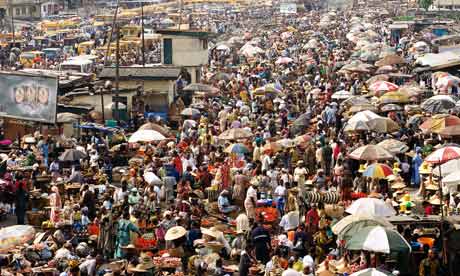The 2011 Liveabililty Ranking and Overview has rated Lagos city as the fourth worst city to live in. Last year, the city ranked fifth after an assessment of living conditions in 140 cities around the world using 30 indicators across five broad categories: stability, healthcare, culture and environment, education, and infrastructure.
This was revealed in the latest summary of the EIU Liveability survey for the year 2010 where the state depreciated further from the fifth worst city it was ranked in 2009. With sub-indicators for each of factors such as the availability and quality of both private and public health care coupled with general health indicators, while prevalence of petty/violent crimes with threat of civil unrest/militancy are evaluated for the stability indicator.
The incessant rush-hour traffic congestion on major roads of the metropolis; insufficient low-cost housing, and its attendant impact on the housing needs of the rapidly growing population are glaring examples of the strained infrastructure needs of the city under the infrastructure indicators.
Lagos was ranked 137 in the list of 140 countries surveyed. The city with a population of 18million people had an overall rating of 39.0. The state also earned the score of 25 in stability, 33.3 in both education and health care and an above average score of 52.3 for culture and environment. The recent huge investments by the state government in infrastructure earned the state a score of 48.2.
However the deputy state governor, Sarah Sosan, who oversees the Ministry of Education disagreed with last year’s ranking stating that, “I don’t think the standard of education is low.” She said this during a press briefing held to mark the third anniversary of the current administration. “We need to improve on factors and we’ve been doing that through the rehabilitation of science laboratories, provision of libraries, putting of furniture in place, and so on. We are also aggressively putting structures in place to reduce congestion in our schools.”
On the first position of the worst city to live in the world is the Zimbabwean capital; Harare which was closely followed by Dhaka-the Bangladeshi capital which is currently hosting the cricket world cup and Port Moresby in Papua New Guinea. Other cities on the bottom of the table are Algiers, Karachi, Tehran, Dakar and Colombo. The bottom list was populated mainly by African and Asian cities.
Vancouver again
Vancouver in Canada remained at the top of the ranking, as it did last year and according to the EIU; the position was maintained by the “successful hosting of the 2010 winter Olympics and Paralympics, which provided a boost to the infrastructure and culture and environment categories.”
The Australian city of Melbourne rises to become the second highest ranked city with Vienna; the Austrian capital coming third.
Two other Canadian cities; Toronto and Calgary completed the top five cities most suitable to live in the world according to the EIU liveability survey.
NEXT called up the senior special assistant to the Lagos state government on media; Hakeem Bello but he declined comment saying he will have to get across to the Ministry of Economic Planning which will be privy to such statements before the state government can adequately react to it.
Respondents who reacted to the previous ranking of Lagos were unanimous that the city has enjoyed a fairly stable atmosphere despite its peculiar characteristic as a meeting point for diverse ethnic groups. Yoruba residents in the state are particularly known for their goodwill and cheer, which gives rise to the numerous parties that dot the metropolis during weekends, and even, on some cases, work days. “Lagos is like a house of everything; a mix of everything,” said Justyna Kita, a Polish citizen from Krakow who was an intern at the Murtala Muhammed Foundation
“There is the traffic, the generators, and so much noise. But the people are very friendly and open. They shake my hands in the streets, and are always singing and dancing. I have made so many friends here, and I don’t miss my home for now.” A sociologist, Uwadiegwu Otisi, attributed the city’s stability as a factor responsible for its massive population growth. “Despite the aggression displayed by most Lagos residents, the city has won accolades as a peaceful city,” he said. “And I think it has been a major form of attraction to so many people who decided to relocate to Lagos. A lot of southerners have relocated to Lagos due to the incessant religious skirmishes in the north.”..
